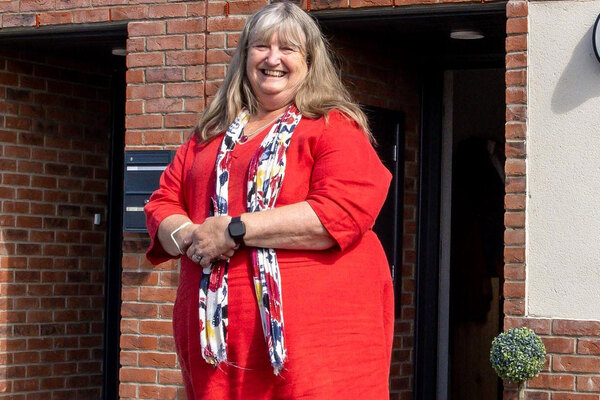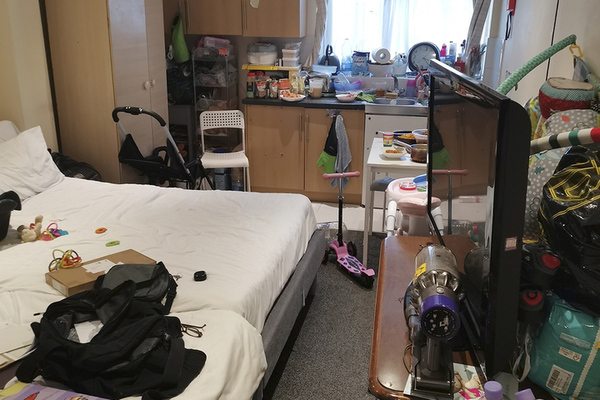You are viewing 1 of your 1 free articles

Polly Neate is chief executive of Shelter
Shelter’s general election manifesto sets out a four-point plan for the next government
Our programme for the next government can comprehensively shift the approach and bring security and affordability to the nation’s homes, writes Polly Neate
Up and down the country, the housing emergency is ruining lives – and as the country looks toward the next general election, it can no longer be ignored. No party can consider itself ready to lead the country unless it is willing to tackle the housing emergency head-on.
This means taking bold action to rebuild our housing system on the generational principle it was designed on: to provide the homes our country needs.
Every day our frontline services hear from people in desperate and terrifying situations, who are struggling to keep a safe roof over their heads because there aren’t enough genuinely affordable homes and private renting is just too expensive and insecure.
For decades, successive governments have failed to build enough social homes and every year we lose more than we build. Without access to safe and secure housing, 1.2 million households are currently stuck on social housing waiting lists, and there are currently 130,000 children homeless and staying in damaging temporary accommodation – the highest ever recorded. Thousands more people are forced to sleep on the street.
The chronic shortage of social homes has meant the size of the private rental sector has more than doubled in the past 20 years. And a lack of effective regulation means that private renters are navigating the highest recorded levels of rent, poor conditions and the threat of an unfair eviction. People are trapped in poor-quality homes that they can barely afford, unable to save and having to cut back on essentials to pay their bills.
“No party can consider itself ready to lead the country unless it is willing to tackle the housing emergency head-on”
Shelter’s general election manifesto, titled The Way Home: a manifesto to rebuild our broken housing system, is a four-point plan for ending the housing emergency, outlining what people across England and the housing sector are demanding from our country’s next government.
The emergency we now find ourselves in is not inevitable. We can and must do better. Taken together, this programme for the next government can comprehensively shift the approach and bring security and affordability to the nation’s homes.
It has been created with the help of 75 people with lived experience of the housing emergency. This includes Clare, a mother of two children with complex needs in Birmingham, who was discriminated against and priced out of private renting.
Clare and her children were forced to spend 18 months being shuffled between 12 different emergency and temporary accommodations, often sharing one room, unable to cook, with no control and no privacy.
A new generation of social rent homes is the only sustainable solution to the housing emergency and the way the country rebuilds its housing system long term. Social rent is the only housing tenure that’s truly affordable because rents are tied to local incomes.
To provide people with safe, secure and affordable homes, political parties across the spectrum must commit to building 90,000 social homes a year for the next 10 years
With private rents continuing to rise while wages stagnate, we must have a plan to prevent people from being trapped in a cycle of financial hardship. We need to make private renting affordable.
This means regulating how much landlords can hike rents within a tenancy each year, to protect people from the stress and instability of huge rent increases. Alongside this, adequate housing benefit is key to protect people from homelessness.
“For decades, successive governments have failed to build enough social homes and every year we lose more than we build”
To stop people’s homes making them sick, we need better management, robust regulation and proper enforcement standards for rented homes. Alongside the implementation of the Social Housing (Regulation) Act, there must be investment in social homes to improve conditions for social renters. And for the private rented sector, local authorities need stronger powers to hold rogue landlords to account.
Lastly, stronger and clearer housing rights are integral to tackling homelessness and allowing people to understand where and how to find the support they need for their housing situation to address problems before they escalate.
Alongside this, we must give everyone at risk of street homelessness a legal right to suitable emergency accommodation and adequate support.
Politicians must now be ready to respond. This emergency will not solve itself. But it has a solution, and those who experience the worst of it know what the answer is. At the next election the nation is demanding – and expecting – leaders to deliver change to end the housing emergency. Anything less is a commitment to further suffering.
Polly Neate, chief excutive, Shelter
Sign up for our homelessness bulletin
Already have an account? Click here to manage your newsletters












